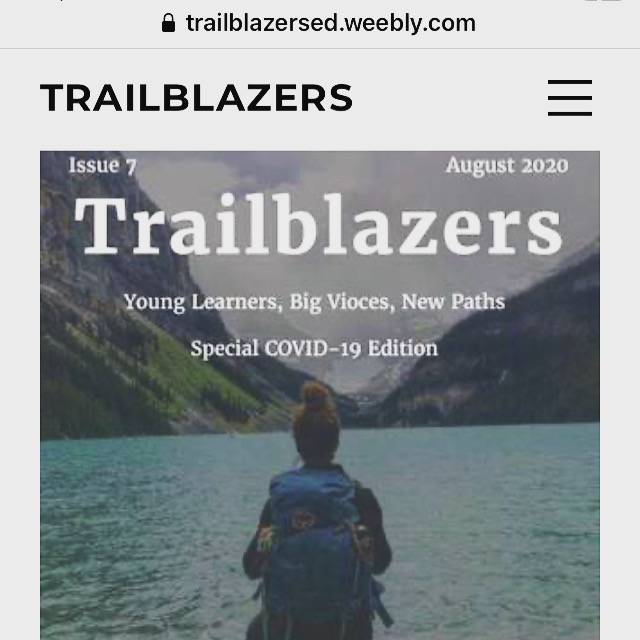As always, I’m so excited to say we have published yet another issue of Trailblazers!!!! But if I’m being honest, Issue 7 was the probably the most challenging production process yet and I’m mainly writing this post because I just really needed to reflect on it.
I’m a big supporter of transparency, so with that in mind, I’d like to point out that the Trailblazers team actually started this semester intending to take a short hiatus from publishing and spend that time re-examining our business structure in order to be a more sustainable organization in the long run. Having published our magazine for three years, we felt it was time to revisit our organizational foundation, direction, and strategy. With most of our high school team graduating, my co-founder transferring universities, and me being half way around the world, this felt like the right time to take a step back in order to remember why we started this magazine and figure out how we could do our work more efficiently.
I had just finished writing a whole article about this decision, defining “organizational foundation, direction, and strategy,” outlining the questions we would be analyzing, and describing our next steps. (Part of me almost wants to publish it despite it’s out datedness because I was kind of proud of how it turned out “business writing” wise.) My co-founder and I had agreed we would wait until after the high schoolers were back from their school trips and spring break to tell them our decision. Coincidentally though, one of the seniors reached out about needing to take a step back and the other (my sister) had already said as much, so we went ahead and spoke with them during the break and decided we’d make the news public when everyone got back.
And then, by the end of break COVID19 hit… so we didn’t “get back.”
This pandemic has affected every aspects of life, but one of the greatest impacts has been schools moving to distance learning. This rapidly changed the essence of “school” and brought into question foundational principles many have taken for granted like the very idea that school requires coming into a communal building and sitting at a desk and the role of parents in education.
The Trailblazer’s team knew we already weren’t in the best position to publish an issue this semester, and we knew the pandemic would bring it’s own challenges, but we also knew this was a time vitally important for young learner’s voices to be heard and we wanted to do our part to amplify a few of those voices.
So we got started late – not until almost the begining of May – and with no writers in the works and basically a team of only two (myself and my co-founder, though my sister did some feedback work and connected us to one of the young learners so we acknowledged her help as well in this issue), yet somehow, we pulled it off. We might’ve been behind on our intended schedule, and there are things we would’ve liked to have done slightly differently, but honestly I’m just proud that we made it happen and before the end of summer.
I’m grateful to all the learners we worked with that contributed their time while juggling so many other changing parts of life. I’m thankful for my partner in crime who worked with me while we were both taking full course loads this entire summer (also a Trailblazers first) and hosting virtual design thinking workshops, plus she got sick for a week and had her computer break down and still made things happen. And I’m hopeful that these stories give more insight into how young learners can tackle big challenges with resilience and grace.
I honestly don’t know what the future has in store for Trailblazers. After I graduated, the intent was for the founders to slowly become less involved in the process and just serve as mentors; however, we have struggled to make this a reality. I don’t think we will be able to do another publication with just our team of two and as a business student, I frequently question if our work is creating a great enough impact to counter the time and stress costs to keep this organization running- thus, how the original conversation of taking a hiatus to revisit our purpose and goals came about. We considered finding a teacher to partner with that wanted to make Trailblazers a part of their classwork, this way we could keep the magazine alive but also have a more consistent source of new production team members, but that plan kind of fell through. And since publishing Issue 7 we’ve not yet revisited these big questions.
Personally I don’t want Trailblazers to die, but I also know things can’t go on the way they’ve been operating, and I’m also aware that sometimes projects need to come to an end for a new one to start and I’ve never been good at making that call, so I’m at a cross roads. I wonder if my desire to keep Trailblazers alive is selfishly motivated and if maybe my efforts could better be spent elsewhere. But I also would like to believe there are at least some readers out there who appreciate our work and that the Trailblazers production team and spotlight learners have made a positive contribution to the conversations around the role young learners should play in the movement to transform education. The questions remain, if we stopped publishing would anyone care, would there be a loss of value, and even if so does that really imply we should continue, or have we made our point and is it time to say “good job, what’s next?”
I guess that’s all I can say about Trailblazers future for now until further conversations with the team. This was a crazy production process that involved a heavy and quick work load on top of a lot of other external and internal obstacles, but I’m glad we decided to move forward with the creation of Issue 7 and am open minded about whatever comes next on this journey.


 I’ve talked to dozens of people about “real world skills” and despite all the debating in terms of which words are the best ones to include on this metaphorical list, good communication skills always seems to come up.
I’ve talked to dozens of people about “real world skills” and despite all the debating in terms of which words are the best ones to include on this metaphorical list, good communication skills always seems to come up.






